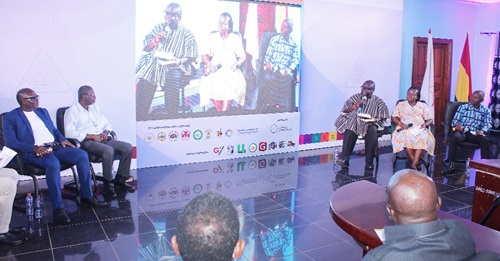
Step up education on radiation — Panellists
Advocates have called for intense education on the actual effect of radiation on humans and the environment to correct a number of conspiracy theories being bundled around.
They said awareness creation on the positives and negatives of radiation was necessary to propel a clearer understanding of radiation to drive out fears being created by some so-called experts.
They made the call at an engagement organised by the Radiation Protection Institute (RPI) of the Ghana Atomic Energy Commission (GAEC) to discuss issues pertaining to myths and issues about radiation in the country.
It was on the theme: "Ensuring radiation protection for workers, the public and environment: The role of Radiation Protection Institute.
The panellists said communication needed to trickle down to the assembly level where misinformation spread faster on what gadgets actually emitted with the media championing the drive.
“Key to achieving that, they said, was the breaking down of scientific terminologies and translating such into the various Ghanaian languages,” they proposed.
The panellists were the Chief Executive Officer (CEO) of the Ghana Chamber of Telecommunications, Dr Kenneth Ashigbey; a representative of the Ghana Health Service (GHS), Stephen Boateng; the Ghana Chamber of Mines, Christian Debrah; the Director, Radiation Protection Institute, Dr Eric Tetteh Glover, and a representative from the Environmental Protection Agency, Doris Dushie.
Leading the charge at a public engagement on radiation protection in Accra yesterday, Dr Ashigbey said the true state was that the "level of radiation in Ghana as compared to the rest of the world, was really low."
Dr Ashigbey, an engineer by profession, was concerned about some erroneous impressions being created by emissions from masts mounted by telcos, stressing that telecommunications masts and their antennas were safe for humans and are highly regulated.
He explained that telecommunications antennas radiates non-ionisation radiation and not ionisation radiation, meeting the standards set by the International Commission of Non Ionisation Radiation Protection has set standards.
“In Ghana RPI and NCA have been carrying out independent monitoring and measurement of radiation for a long time. The highest compliance percentage was 10.21 per cent for just 1 year.
“Most of the other years range between 0.48 per cent and 2.98 per cent, all of these far lower than the standards,” Dr Ashigbey stated. Mr Boateng was of the view that much as the radiation levels were low, "we are not wholly free".
To him, putting the right infrastructure and maintaining radiation levels in Ghana was expensive, making it even more dangerous in areas such as the rural areas where supervision was low.
Both Mr Debrah and Dr Glover pushed for more funding into research to assess the right levels of radiation while insisting that such findings should be made available to aid industry.
Importance
Contributing to the programme, the Director-General of the Ghana Atomic Energy Commission, Prof. Samuel B. Dampare, said radiation, harnessed through various technologies, afforded people-versatile tools that had an important role to play in support of sustainable development.
He said radiation had useful applications in agriculture; telecommunication; and archaeology- using carbon dating; space exploration; law enforcement; geological resources prospecting and exploitation -including mineral mining and oil exploration, among others.
Prof. Dampare while radiation offered immense benefits for socio-economic development, it was crucial to acknowledge its potential hazards to humans and the environment and find ways to address them.
He called for collaboration with all stakeholders, saying: "By working together, we can build a robust radiation safety framework and safety culture in Ghana."
The RPI
The Radiation Protection Institute (RPI), one of seven institutes under GAEC, was established to ensure the protection of human health and the environment from any potential hazards of radiation use.
It works to protect the public through monitoring the spaces accessible to members of the public that adjoin radiation user facilities, as well as studying natural radiation levels in the environment.
The RPI has served as the cornerstone and foundation of Ghana's national radiation protection framework.
